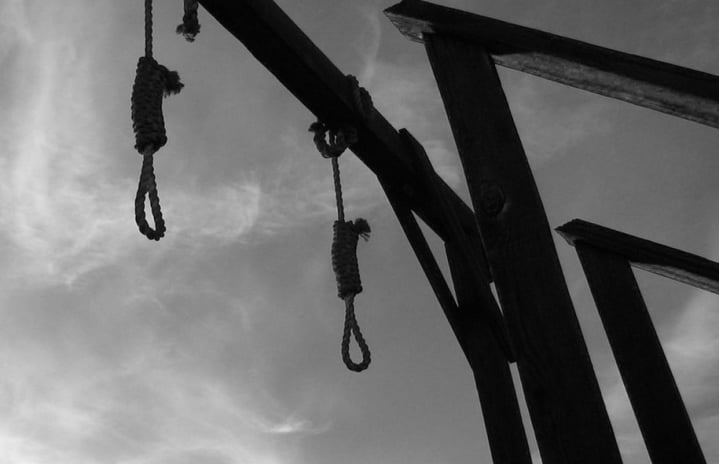On July 30, President Dr Mohamed
Muizzu announced this administration’s intention to include stricter penalties
for drug trafficking, including capital punishment.
The President stated that this is
done in numerous other countries, and said a key aim of this government is to
cultivate a drug-free generation and eliminate the societal harms caused by
drugs.
The government announced last year
that the death penalty had been included in the draft bill of amendments to the
Drugs Act. However, this was omitted from the bill when it was submitted to
parliament late last year. Now, the government aims to once again include it,
prescribing capital punishment for drug trafficking in the law.
Capital punishment for drug
trafficking: the global trend
As per a report by Harm Reduction
International (HRI), there were over 3700 people on death row for drug related
crimes worldwide as of December 2022.
It states that as of then, 35
countries worldwide prescribe death penalty for drug related offences. Amnesty
International declared six of these as abolitionist (no executions for any
crimes in ten years despite sentencing).
In some other countries in the list,
capital punishment is neither sentenced nor enforced despite laws prescribing
it.
Implementation of death penalty is
observed as being highest in Asian countries, with countries like China,
Indonesia, Malaysia, Iran, North Korea, Saudi Arabia, Vietnam and Singapore on
the top of the list. Exact numbers of executions are unavailable due to lack
of transparency and media censorship in some of these countries.
Singapore enforces the
death penalty for drug trafficking. Should the Maldives adopt similar
legislation, it would become the second South Asian nation to actively
implement capital punishment for such offences. While Sri Lanka’s law also
prescribes the death penalty for drug trafficking, the country currently
maintains an unofficial moratorium on its enforcement.
Disproportionate sentences
As per the Drugs
Act, the current penalty for drug trafficking is a life sentence in prison,
along with a fine of between MVR 100,000 and MVR 10 million.
This stands the same
regardless of the scale of offence, as if the offender is seen to possess
anything above a set threshold, for example 14g of cannabis, it becomes
considered as drug trafficking.
With this, the same
hefty fine and long prison sentence apply to those on whom 14g are found, or
1400g or more.
“There is no
distinction between a young offender, who may be dappling in drugs as
experimentation, or a hardcore drug dealer. Both are faced with the same harsh
sentences,” Defence Lawyer Hamza Latheef opined.
In his view, it
would be more rational to use logical deductions, such as through their history
or financial state, to determine if an offender was, in fact, trafficking
drugs, or was possessing some amount for personal use.
Hamza said that the
penal code, which covers about 90 percent of criminal offences, allows the
judge the prerogative to issue graded sentences based on the offence in
question. However, the Drugs Act allows no such distinction.
This, he said,
creates an environment where people try to escape ‘by hook or by crook’.
Hamza believes the
allowance of graded sentencing would save valuable time for all involved,
including law enforcement, courts, prosecutors and defence lawyers.
He reflected on how
major drug cartel operators had been prosecuted during the administration led
by former President Mohamed Nasheed and the latter days of former President
Maumoon Abdul Gayoom.
Since then, major
drug busts have seen a decline, with what amounts to multiple cases of what can
be considered ‘small fry’ in the drug trade increasing in prevalence.
“I believe this is
because the system is inundated by cases due to there being no graded system.
Every case, including those involving 14g of cannabis, is being proceeded as a
major drug case, leaving institutions buried in the process and unable to
prioritize.”
This, Hamza feels,
limits law enforcement and the judicial system from categorizing cases by their
weight, and from leading the war against drugs in a meaningful way.
Death Penalty: a
burden on the State
As the law stands, capital punishment is only sentenced in cases
of intentional killing. There are, even at present, a number of prisoners on
death row.
However, Maldives has had a moratorium on the implementation of
death penalty since 1953.
“People remain on death row for 99 years, or until such a time comes when the death sentence is implemented, so it is in effect a burden on the State to keep them incarcerated for life."Hamza Latheef, Defence Lawyer
Hamza raised the
point that even though death sentences are handed out in cases of intentional
killing, with the moratorium on enforcement, they remain in prison for long
periods on State expenses.
“People remain on
death row for 99 years, or until such a time comes when the death sentence is
implemented, so it is in effect a burden on the State to keep them incarcerated
for life,” Hamza said.
He pointed out that
former President Abdulla Yameen had also announced that he would be lifting the
moratorium, setting in place a regulation for its enforcement. However, it had
remained unenforced even as his term came to end.
“The procedure is
now in a regulation. But the government does not want to implement the death
penalty under a regulation,” Minister of Homeland Security and Technology Ali
Ihusan said on July 31, reiterating the President’s announcement that it would
instead be incorporated in the law.
Hamza also shared
the view of many that the Maldivian judiciary is not yet ready to enforce the
death penalty – an irreversible act.
“Many have concerns
of corruption and other such issues within the judiciary, but I feel there is a
more practical reason as well. That is, the judiciary lacks capacity. No
administration so far has made sufficient investment in the judiciary. Today,
we see the judiciary struggling with space constraints, long working hours,
employee dissatisfaction due to low pay and being understaffed and other such
fixable woes. Taking into account all of this, the judiciary is not yet ready
for implementing the death penalty.”
Hamza feels
introducing the death penalty for drug trafficking will only prove to further
inundate the judicial system, and increase the potential for subverting justice
through various means.
Is death penalty the
ideal deterrant?
“This cannot be
stopped unless we punish the traffickers severely,” Minister Ihusan previously
said, “The death penalty for those taken from supply-side
operations will be a permanent solution.”.
The issue has reignited public debate, particularly over the
longstanding issue of capital punishment not being enforced in murder
cases—raising doubts over whether harsher penalties will deter drug-related
crimes.
“The issue does not lie with prescribed penalties, but rather in the fact that these penalties are not enforced.”Hussain Shameem, Former PG
“Uprooting the drug
trade as it is currently in the Maldives is going to need a collaborative,
herculean effort. It comes across as a small capital, high return, lucrative
endeavour for youth. In the case of established drug traffickers, their money
flows into politics, real estate and such, granting them a layer of impunity. A
real effort is required to uproot this,” Hamza said.
“The question is do
we have the political will and the funds for the war on drugs? Are we
willing to invest, are we going to go after the cartels?”
Hamza also pointed
out that in Islamic jurisprudence, the death penalty is only prescribed for
intentional killing. Drugs, or as it were, narcotics, only carry corporal
punishment in the form of lashes.
Former Prosecutor
General Hussain Shameem was unequivocal in his response.
“The issue does not
lie with prescribed penalties, but rather in the fact that these penalties are
not enforced.”
Shameem spoke about
how, at present, when a court sentences an offender to prison, appeals are made
outside of the system to their MPs or other influential individuals, or during
election campaigns, leading to them being freed without serving their time.
“The convicted knows
they can get free from jail within five years, which renders the system
ineffective,” Shameem said.
“This issue can be
resolved through voiding parole and keeping those sentenced incarcerated for
the duration of their sentence without external interference.”
The issue lies with
lack of enforcement, and not with the penalties prescribed, Shameem reiterated.
If, after this is properly implemented, the issue persists, then introducing
harsher penalties can be considered, he said.
Shameem took up the
example of child sexual abuse cases. He pointed out that no one is recommending
the death penalty for such offences.
“This is because
everyone is confident that a person convicted of such a crime will stay in
jail. In such cases, the family won’t appeal to the PG or an MP for leniency.
No one will intervene and try to free them, or grant them pardons,” Shameem
said.
Shameem said that
the same can be achieved for drug trafficking cases, through collaborative
effort from the relevant institutions.
International
Organizations weigh in
Nine international
organizations issued a statement calling on the Maldives to reject the
introduction of death penalty for drug trafficking. This includes Amnesty
International, Human Rights Watch, International Federation for Human Rights
(FIDH), Harm Reduction International and The Advocates for Human Rights.
“There is no conclusive evidence that the death penalty has a
unique deterrent effect on crime,” the statement reads.
“It is further alarming that President Muizzu portrayed the
death penalty as a tool “to save the society from the scourge of drugs and to
build a generation free from drugs”. The promotion of highly punitive “zero
tolerance” and “iron-fist on drug crime” approaches that are not rooted in
evidence supports a culture of misinformation and human rights violations.
Effective drug control policies must be centered around health and rights,
addressing the root causes that lead people to engage in the drug market,
including poverty, unemployment and marginalization.”
The introduction of the death penalty for a crime that was not
previously punishable by death would go against the goal of abolition set out
under Article 6(6) of the ICCPR, to which the Maldives acceded in 2006, the
statement points out.




